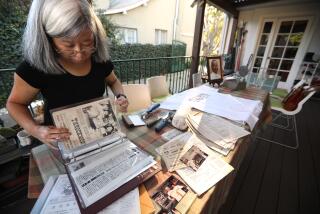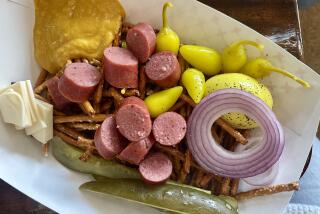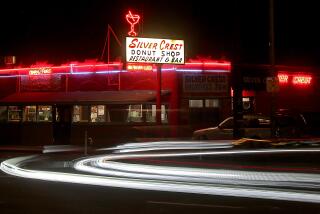Op-Ed: In the struggle of convenience vs. Canter’s, the deli is losing at 3 a.m.
When you’re 25, a Western omelet tastes best consumed at 2:30 a.m. At that hour, when the drunkenness from a night of clubbing is wearing off and the missed sexual opportunities of the evening have been wrung out to dry, coffee is your friend, home fries are the best move potatoes ever made, and you’re Alexander Woollcott at the Algonquin Round Table basking in punch-drunk wit and camaraderie.
When I was a young man fumbling his way through L.A. club life in the early 1990s, wearing sport coats with hunchback shoulder pads and drinking watered-down rum and Cokes, the best part of the night was always the after-meal. On the Westside where I lived, there were only a few options, notably Larry Parker’s Beverly Hills Diner. But we always gravitated toward Canter’s Deli on Fairfax Avenue.
It’s hard to argue against convenience, but the internet’s promise of community through connectivity is instead drifting towards shut-in torpor.
Larry Parker’s drew young Brentwood and Santa Monica kids, overdressed and uncool. Canter’s was the more appealing option: scruffy and boisterous, with louche scenesters sharing booths with leather-clad rockers. The wait staff was always punctilious, and the food was beside the point, really. As a New York kid now living in a city that rolled up every night at 2 a.m., I looked upon Canter’s as an oasis of authenticity.
Now, after 86 years as a round-the-clock restaurant, Canter’s has announced it will close its dining room from 3 to 8 a.m. weeknights. On Twitter, the deli’s owners posted: “We’ve been getting lonely… it seems as if, during those hours, most of you really like to eat our delicious sandwiches and black&white cookies at home in your pjs.” They will continue to offer all-night takeout and delivery though popular phone apps such as GrubHub, ChowNow, Doordash.
Remember in the initial, euphoric rush of mobile technology, when we used our smartphones to guide us toward things, as divining rods for cool activity? We checked in on Foursquare, checked out Yelp for the best ramen. We wanted our friends to know we were somewhere other than on our couches. With the explosion of delivery apps, we are now content to post pictures of ramen bowls sitting on our coffee tables.
I can’t help thinking that Canter’s new policy is a symptom of a larger cultural shift, a social turning inward. Convenience is a wonderful thing, but not at the expense of modest adventures, and dining out late at Canter’s was just that. Sure, Canter’s will still stay open all Friday and Saturday nights, but to be out late on a “school night” was once a marker of young adulthood.
And millennials are staying in on Friday and Saturday, too. According to the National Restaurant Assn., 80% of 18- to 34-year-olds said they favor food delivery over dining out, compared with just 60% of older adults. Of that millennial group, 82% place their Uber Eats orders on weekends. In other words, those among us with the most energy are happiest to expend very little of it.
In the days of Color Me Badd and C&C Music Factory, the evening was always bifurcated into club time and the period after last call, when the social group thinned out to the core friends who wanted to eat unhealthy food at an unhealthy hour. It was a relief to not scream over blasting PAs while those veteran Canter’s waiters kept the coffee cups full.
I can’t recall a thing that happened in those lame clubs, but the late meal memories are permanent. Confidences were shared and personal lives dissected — intimacies that can only be established over cold pancakes and eggs at four in the morning. I walked friends through the wrenching process of coming out to their families, or consoled broken hearts with blithe tough love, usually with a slurred “get over it.” We nurtured one another and forged a community of friends at tables in Canter’s.
It’s hard to argue against the convenience of Uber Eats, Eat24 and all of the other handy food apps. But the internet, which not long ago promised community through connectivity, is instead delivering shut-in torpor. Dine-in wisely; you get more than a club sandwich by eating in a too-bright deli at 3 a.m.
Marc Weingarten is the author of “Thirsty: William Mulholland, California Water and the Real Chinatown.”
Follow the Opinion section on Twitter @latimesopinionand Facebook
More to Read
A cure for the common opinion
Get thought-provoking perspectives with our weekly newsletter.
You may occasionally receive promotional content from the Los Angeles Times.






